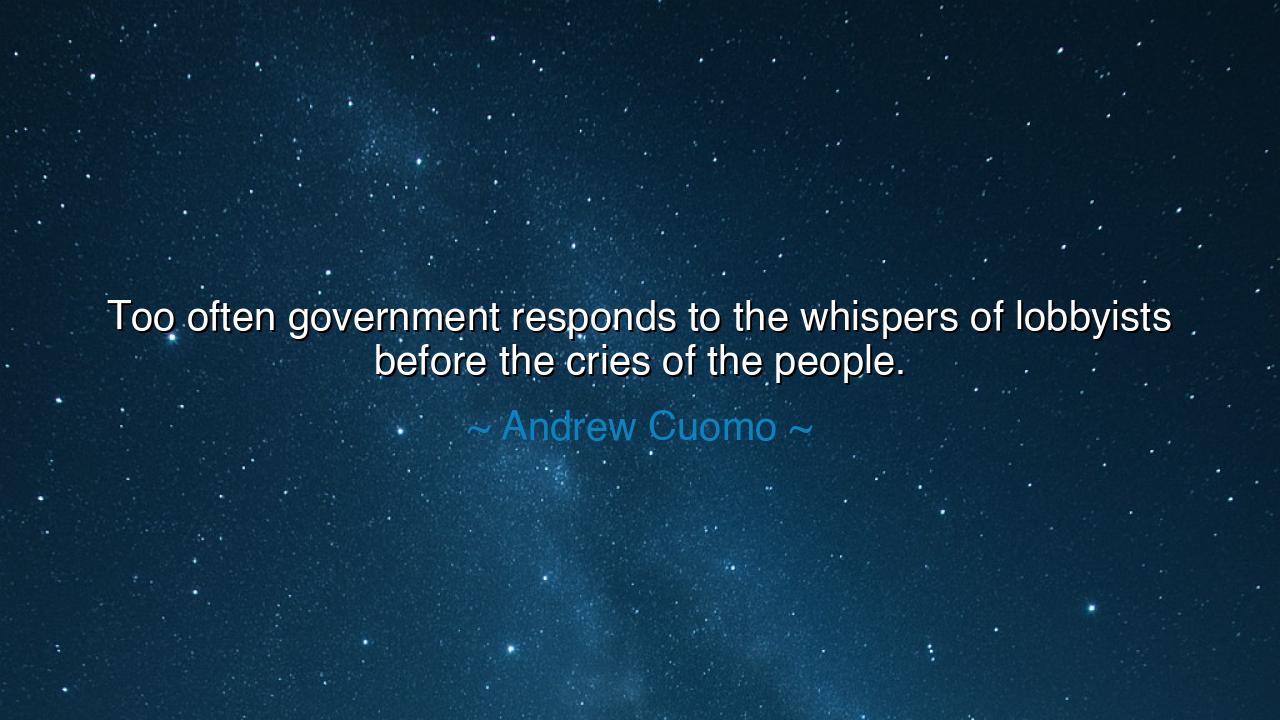
Too often government responds to the whispers of lobbyists before
Too often government responds to the whispers of lobbyists before the cries of the people.






In the solemn voice of a man who has seen the inner workings of power, Andrew Cuomo once declared: “Too often government responds to the whispers of lobbyists before the cries of the people.” These words, simple yet thunderous in truth, strike at the heart of democracy’s eternal struggle—the battle between influence and integrity, between the silent wealth of the few and the loud need of the many. In this statement, Cuomo is not merely condemning corruption; he is revealing a tragic inversion of purpose, a moment when the servant becomes the master, and government forgets its sacred duty to those it was born to protect.
To understand his meaning, we must look to the nature of government itself. In its purest form, government is meant to be the guardian of the people—a structure of justice, forged from their will, to shield them from chaos and oppression. Yet, as time and prosperity advance, another force arises: the lobbyist, the voice of wealth and private interest, who whispers softly into the ears of those in power. These whispers promise convenience, advantage, and reward—but their music is dangerous. For while the cries of the people rise from necessity and suffering, the whispers of the few rise from ambition. When rulers lend their ears to the soft voice of privilege and close them to the loud plea of the common soul, democracy begins its slow decay.
This conflict is as ancient as civilization itself. In ancient Rome, the Republic fell not in a single night, but in years of quiet corruption. Senators who once spoke for the people grew rich from the gold of the patricians. Laws that had been born from justice became tools of power. Bread was promised to the hungry, but the loaves were broken by the powerful before reaching the poor. Thus, the Roman people traded their freedom for spectacle, and the Republic died not with a sword, but with silence. So too does Cuomo’s warning echo through the ages—that the death of a just government rarely comes from external conquest, but from the erosion of its conscience within.
In modern times, this truth remains unchanged. Consider the financial crisis of 2008, when reckless greed among the powerful brought ruin to millions of ordinary people. The cries of families losing their homes filled the streets, yet the whispers of bankers reached the ears of Congress first. Bailouts were granted, not to those who had been wronged, but to those who had caused the wrong. It was a moment when the veil of democracy was torn, and citizens saw clearly the machinery behind the curtain—a government that had listened not to the people, but to their creditors. This is the injustice Cuomo speaks of: when policy bends to power, and justice becomes the privilege of those who can afford it.
But his words are not only an accusation; they are a summons. For if the cries of the people are to be heard, the people themselves must not be silent. Governments are reflections of those they govern, and when apathy reigns, corruption thrives. The powerful whisper because they can; the people must cry because they must. Yet if their cries remain scattered and faint, they are lost in the marble halls of authority. The lesson, then, is not merely to condemn the government’s deafness, but to strengthen the voice of the governed—to speak, to organize, to demand that the public good once again take precedence over private gain.
The ancients taught that true leadership is a form of stewardship. Confucius said that a ruler must listen first to the pain of his people, for only through their wellbeing can he find his own peace. Likewise, Abraham Lincoln, centuries later, echoed this sentiment when he declared that government must be “of the people, by the people, for the people.” To serve any other master—be it wealth, ambition, or vanity—is to betray the very foundation of governance. Cuomo’s quote is a cry for remembrance, a call to return to that sacred balance where rulers see not numbers or profits, but faces and souls.
Therefore, my children of this age, take heed of this wisdom: never allow your government to forget its purpose. Let not the whispers of the privileged drown out the voice of the many. For power bends easily toward those who speak softly in hidden chambers, while truth must shout from the public square to be heard. If you wish to live under a just rule, then make your voice impossible to ignore. Petition. Protest. Vote. Speak truth even when silence is easier, for silence is the ally of tyranny.
Remember always Andrew Cuomo’s warning—that democracy dies not when the people are weak, but when their rulers stop listening. And so, the burden and the blessing of freedom rest upon you. Do not whisper as the lobbyists do; speak as the people must—boldly, truthfully, and together. For the government that listens to the cries of its people, and not the whispers of power, is not only strong—it is righteous. And in righteousness, all nations find their lasting peace.






AAdministratorAdministrator
Welcome, honored guests. Please leave a comment, we will respond soon